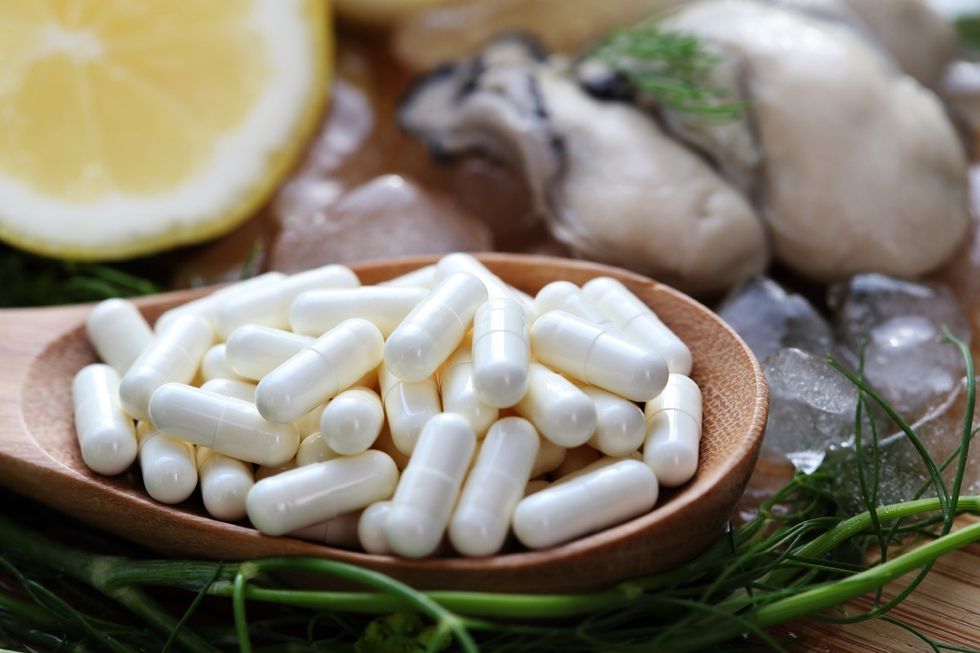The winter weather can have our health looking a little worse for wear. As the temperatures grow colder, we may become more susceptible to numerous problems, including respiratory illnesses, headaches, and mood changes. And even if you're focused on making sure you eat a healthy diet, engage in regular exercise, and get a good amount of sleep during the winter, it still might not be enough. That's why doctors say that certain supplements can come in handy in the colder months, giving your health a much needed boost. Read on for their six best recommendations.
RELATED: 7 Supplements That Actually Keep You From Getting Sick.
1 | Vitamin D
 iStock
iStockWithout a doubt, the "number one supplement" to consider taking in the winter is vitamin D, Greg Lopez, PharmD, lead researcher for the supplementation and nutrition database Examine, tells Best Life. While our bodies naturally make vitamin D on their own, they need to be exposed to sunlight in order to do so.
"But sunlight is scarce during winter and we’re also pretty bundled up, further limiting sun exposure—all this adds up to lower vitamin D levels," he explains. "Having enough vitamin D in your system is important for musculoskeletal health in general and could help boost your immune system a little to help fight off winter infections."
RELATED: New Report Says Most Americans Are Seriously Lacking Vitamin D—Here's How to Get More.
2 | Pycnogenol
 iStock
iStockCompared to something like vitamin D, you may be less familiar with Pycnogenol, a brand name for French maritime pine bark extract. But Fred Pescatore, MD, a Manhattan-based traditionally trained physician and internist who specializes in nutritional medicine, says he is a "strong believer" in this supplement's antioxidant properties for the winter.
According to Pescatore, Pycnogenol's potential health benefits in the colder months have been strongly backed by research. In 2021, a study found that taking this supplement daily during the dry season "improved skin elasticity and firmness," he noted.
Other studies have also found that it can "shorten the duration of a cold, as well as treat nasal congestion and runny nose due to its natural anti-inflammatory and antioxidant qualities," Pescatore adds.
3 | Omega-3
 iStock
iStockOmega-3 fatty acids can help freshen up your appearance, according to Soma Mandal, MD, a board-certified internist working with Summit Health in New Providence, New Jersey.
"Ever feel that your skin is dry during the wintertime? This is a great supplement that helps combat that dry, flaky skin," she shares.
RELATED: I'm a Dermatologist and I Never Use These 6 Products in Cold Weather.
4 | Lutein
 iStock
iStockIt's not just your skin you should be worrying about in the winter. Saya Nagori, MD, board-certified ophthalmologist and founder of Eye Facts, warns that weather conditions during this season can also have a significant impact on our eye health. That's why she recommends taking the supplement lutein right now.
"Normally found in leafy greens like kale and spinach, lutein protects against eye strain and blue light damage—both of which we are exposed to more of in winter," Nagori explains.
5 | Zinc
 iStock
iStockWinter is cold and flu season, as many of us are all too aware of. To help lower your risk of getting sick, Lopez suggests supplementing with low levels of zinc.
"Zinc supplementation is mostly useful in people with zinc deficiency, which can only be diagnosed by your doctor," he notes. "If you choose to take zinc pills for weeks or months, I’d recommend a dose of 20 milligrams or less daily."
But Lopez says that getting this supplement in another form may help in case of an infection as well.
"Sucking on zinc lozenges as soon as you feel the first symptoms of a cold could help limit (but not cure) the symptoms of a cold," he shares.
6 | Vitamin C
 iStock
iStockSimilarly to zinc, vitamin C might be able to aid in your battles against certain winter illnesses.
"This supplement supports the immune system and can help reduce the duration and severity of colds or flus," Zeeshan Afzal, MD, health expert and medical officer for the healthcare company Welzo, says. "It is also an antioxidant that can protect against oxidative stress."
But Afzal notes that there should be caution taken if you want to start using this supplement.
"Vitamin C is generally safe, but high doses can cause gastrointestinal upset in some people," he points out. "Stick to recommended daily allowances unless advised otherwise by a healthcare provider."
For more wellness advice delivered straight to your inbox, sign up for our daily newsletter.
Best Life offers the most up-to-date information from top experts, new research, and health agencies, but our content is not meant to be a substitute for professional guidance. When it comes to the medication you're taking or any other health questions you have, always consult your healthcare provider directly.





